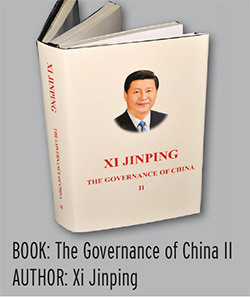President Xi Jinping shares his vision
'As we are working to build a moderately prosperous society in all respects, we also need to consider more long term development requirements'
BOOK REVIEW: THE GOVERNANCE OF CHINA II. BY XI JINPING
The book is a compilation of speeches by China's president Xi Jinping.
In the book, the fourth published by Xi, he outlines his vision for the world's most populous nation, which he sees developing using socialism with Chinese characteristics.
Commemorating Deng
The book begins with a commemoration to Deng Xiaoping, credited with kick-starting the country's economic boom of the last 40 years and recognises his unyielding commitment to communist ideals and unshakable belief in socialism with Chinese characteristics.
Deng allowed private enterprise directed by the state as means to spur economic growth and the uplifting of the Chinese, breaking with an earlier orthodoxy that shirked private enterprise. He argued famously that, "It doesn't matter if a cat is black or white as along as it catches mice". Throughout the book Xi emphasises that the economy's growth is not for growth's sake alone, but has to be reflected in the improvement in every citizen's standard of living - the goal is for moderately prosperous society in all respects by 2020.
Xi who assumed the leadership of China in 2012, sees the future of the China's progress anchored in party discipline and internal unity. In his speeches while pushing for continued economic growth has called for wider economic reforms.
"As we are working to build a moderately prosperous society in all respects, we also need to consider more long-term development requirements and accelerate our efforts to create a mode of economic development that is suited to the new normal," Xi says in his speech, The decisive stage in achieving the first centenary goal".
The concept of the new normal comes up often in this 600-page tome and in China's case specifically it refers to the slowdown of economic growth, optimisation of the economic structure and the shift in growth engines. But it is not all about economic growth, while this serves as the cornerstone of the country's progress.
Rule of law
It is also clear to him that China must be governed by the rule of law and the legal institutions need strengthening. On this front he is keen to see the general public involve themselves in the practice of the rule of law as advocates, observers and defenders. But he goes beyond legalese to insist that alongside the role of the law, to regulate behaviour there must be a rule of virtue, where ethics plays the role of shaping the mind in a complementary loop.
"By raising the moral integrity of our people as a whole, we will create a favourable humanistic environment to underpin the rule of law in China."
There are also a series of speeches on cultural confidence, well-being of the people, diplomacy and military development.
Xi has the distinction of being the only leader of the People's Republic of China born after the Second World War. He was born in 1953. This and his background — his father was purged during the Cultural Revolution and family exiled to rural Yanchuan county, have obviously informed his thinking, which comes out in this collection of speeches.
While China has made tremendous strides in the last four decades, neither the country nor Xi is resting on their laurels. There is still a lot more work to do and this realisation is evident all through the book.
Books such as these often grow in importance in later years, as a study of the thinking of the main actors of the day. But it also serves a useful purpose of allowing outsiders witness history in the making and maybe learn on the go.
It is a valuable book, one that should be read by all policy makers and students of history to understand firsthand what China's elite are thinking about the challenges facing not only them but the world as well
